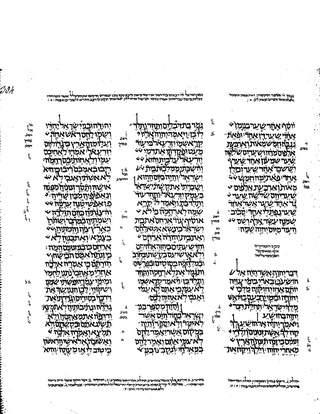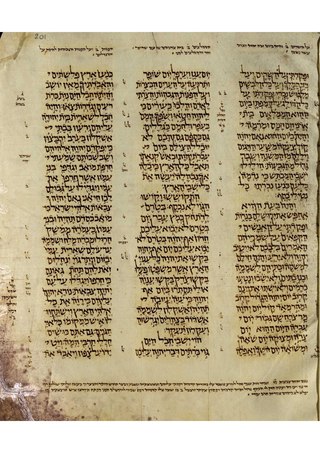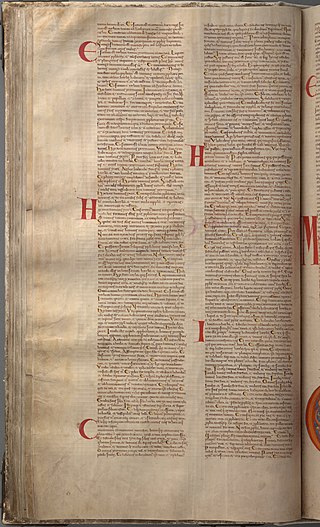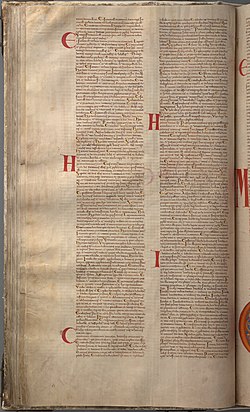Isaiah 26 is the twenty-sixth chapter of the Book of Isaiah in the Hebrew Bible or the Old Testament of the Christian Bible. This book contains the prophecies attributed to the prophet Isaiah, and is one of the Books of the Prophets. Chapters 24–27 of Isaiah constitute one continuous poetical prophecy, sometimes called the "Isaiah Apocalypse".

Zechariah 4 is the fourth of the 14 chapters in the Book of Zechariah in the Hebrew Bible or the Old Testament of the Christian Bible. This book contains the prophecies attributed to the prophet Zechariah, and is a part of the Book of the Twelve Minor Prophets. This chapter is a part of a section consisting of Zechariah 1–8.

Zechariah 3 is the third of the 14 chapters in the Book of Zechariah in the Hebrew Bible or the Old Testament of the Christian Bible. This book contains the prophecies attributed to the prophet Zechariah, and is a part of the Book of the Twelve Minor Prophets. The chapter contains the vision of Joshua, the high priest, being cleansed before God. It is a part of a section consisting of Zechariah 1–8.

Zechariah 2 is the second of the 14 chapters in the Book of Zechariah in the Hebrew Bible or the Old Testament of the Christian Bible. This book contains the prophecies attributed to the prophet Zechariah, and is a part of the Book of the Twelve Minor Prophets. This chapter is a part of a section consisting of Zechariah 1–8. It records the third of eight visions received by the prophet, followed by an oracle calling the exiles to return to the city where Yahweh is about to dwell and all nations will come.

Zechariah 5 is the fifth of the 14 chapters in the Book of Zechariah in the Hebrew Bible or the Old Testament of the Christian Bible. This book contains the prophecies attributed to the prophet Zechariah, and is a part of the Book of the Twelve Minor Prophets. This chapter records the sixth and seventh of the eight visions of Zechariah which are compiled in a section consisting of Zechariah 1–8.

Zechariah 6 is the sixth of the 14 chapters in the Book of Zechariah in the Hebrew Bible or the Old Testament of the Christian Bible. This book contains the prophecies attributed to the prophet Zechariah, and is a part of the Book of the Twelve Minor Prophets. This chapter contains the description of the eighth vision and the crowning of Joshua. It is a part of a section consisting of Zechariah 1–8.

Zechariah 9 is the ninth of the 14 chapters in the Book of Zechariah in the Hebrew Bible or the Old Testament of the Christian Bible. This book contains the prophecies attributed to the prophet Zechariah, and is a part of the Book of the Twelve Minor Prophets. This chapter is a part of a section consisting of Zechariah 9–14. It concerns the advance of an enemy, but God defends Jerusalem and his king will triumphantly enter the city to bring peace among all nations. This chapter also contains a continuation of the subject in the seventh chapter. The part about the king's entry into Jerusalem is quoted in the New Testament, especially in the event of Jesus' triumphal entry into Jerusalem.

Zechariah 10 is the tenth of the 14 chapters in the Book of Zechariah in the Hebrew Bible or the Old Testament of the Christian Bible. This book contains the prophecies attributed to the prophet Zechariah, and is a part of the Book of the Twelve Minor Prophets. This chapter is a part of a section consisting of Zechariah 9–14.

Zechariah 11 is the eleventh of the 14 chapters in the Book of Zechariah in the Hebrew Bible or the Old Testament of the Christian Bible. This book contains the prophecies attributed to the prophet Zechariah, and is a part of the Book of the Twelve Minor Prophets. This chapter is a part of a section consisting of Zechariah 9–14.

Ezekiel 26 is the twenty-sixth chapter of the Book of Ezekiel in the Hebrew Bible or the Old Testament of the Christian Bible. This book contains the prophecies attributed to the prophet/priest Ezekiel, and is one of the Books of the Prophets.

Ezekiel 2 is the second chapter of the Book of Ezekiel in the Hebrew Bible or the Old Testament of the Christian Bible. This book contains the prophecies attributed to the prophet/priest Ezekiel and is one of the Book of the Prophets. In this chapter, set within a wider section from Ezekiel 1:28b to Ezekiel 3:15, "Ezekiel receives a commission [from God] to go to the 'rebellious house' of Israel" and to speak for God.

Ezekiel 5 is the fifth chapter of the Book of Ezekiel in the Hebrew Bible or the Old Testament of the Christian Bible. This book contains the prophecies attributed to the prophet/priest Ezekiel, and is one of the Prophetic Books. This chapter contains the prophecies using the division of the prophet's shaved hair as a sign, showing God's judgment upon Jerusalem, by pestilence, by famine, by the sword, and by dispersion. The siege is described again in chapter 6.

Ezekiel 6 is the sixth chapter of the Book of Ezekiel in the Hebrew Bible or the Old Testament of the Christian Bible. This book contains the prophecies attributed to the prophet/priest Ezekiel, and is one of the Books of the Prophets. The high places in the mountains of Israel, "the seats of her idolatry", are the focus of Ezekiel's prophecies in this chapter.

Jeremiah 47 is the forty-seventh chapter of the Book of Jeremiah in the Hebrew Bible or the Old Testament of the Christian Bible. This book contains prophecies attributed to the prophet Jeremiah, and is one of the Books of the Prophets. This chapter is part of a series of "oracles against foreign nations", consisting of chapters 46 to 51. In particular, chapters 46-49 focus on Judah's neighbors. This chapter contains the poetic oracles against the Philistines.

Ezekiel 13 is the thirteenth chapter of the Book of Ezekiel in the Hebrew Bible or the Old Testament of the Christian Bible. This book contains the prophecies attributed to the prophet/priest Ezekiel, and is one of the Books of the Prophets. This chapter contains rebukes against "a variety of false prophets", Ezekiel 13:1-16, and false prophetesses, Ezekiel 13:17-23.

Ezekiel 22 is the twenty-second chapter of the Book of Ezekiel in the Hebrew Bible or the Old Testament of the Christian Bible. This book contains the prophecies attributed to the prophet/priest Ezekiel, and is one of the Books of the Prophets. Chapters 20 to 24 contain a series of "predictions regarding the fall of Jerusalem", and this chapter contains three separate prophecies centering on the inevitable punishment due to the city's guilt.

Ezekiel 29 is the twenty-ninth chapter of the Book of Ezekiel in the Hebrew Bible or the Old Testament of the Christian Bible. This book contains the prophecies attributed to the prophet/priest Ezekiel, and is one of the Books of the Prophets. Chapters 29–32 contain seven oracles against Egypt, balancing the seven oracles against Israel's smaller neighbors in chapters 25–28.

Ezekiel 36 is the thirty-sixth chapter of the Book of Ezekiel in the Hebrew Bible or the Old Testament of the Christian Bible. This book contains the prophecies attributed to the prophet/priest Ezekiel, and is one of the Books of the Prophets. This chapter contains two prophecies, one conveying "hope for the mountains of Israel" and one declaring that Israel's restoration is assured. Biblical commentator Susan Galambush pairs the first of these with an oracle condemning Mount Seir in Edom in the previous chapter.

Ezekiel 39 is the thirty-ninth chapter of the Book of Ezekiel in the Hebrew Bible or the Old Testament of the Christian Bible. This book contains the prophecies attributed to the prophet/priest Ezekiel, and is one of the Books of the Prophets. The previous chapter and verses 1-16 of this chapter form a section dealing with "Gog, of the land of Magog".

Jeremiah 41 is the forty-first chapter of the Book of Jeremiah in the Hebrew Bible or the Old Testament of the Christian Bible. This book contains prophecies attributed to the prophet Jeremiah, and is one of the Books of the Prophets. This chapter is part of a narrative section consisting of chapters 37 to 44. Chapter 41 recounts the murder of Gedaliah, the Babylonian governor of occupied Judah, and the chaotic situation which followed this event. Jeremiah himself is not mentioned in this chapter.








